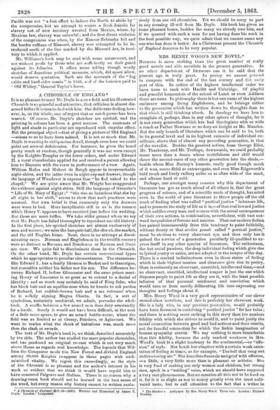A CHRONICLE OF ENGLAND.*
Ii is so pleatant to meet M r. Doyle in a new field, and his illustrated Chronicle is so graceful and attractive, that criticism is almost die- armed before it comes to deal with Iiiin. Our delibetate feeling, how- eVer, is, on the whole, One of regret that sci'mlich power has been wasted. Of course, Mr. Doyle's sketches are spirited, and the printing in colours hie been a great success. The contrasts of light and shade in particulat are reproduced with singular effect. Hilt the principal object that Of giving a picture of Old England .4seems to its to have been iniaised. It is not so Much that Mr. Doyle is wanting in antiquarian detail, though even here we could point out several defiCiencies. For instance, he gives the beard pretty Much at random, though generally it was not worn except by the Knights-TemPlat or the loitei ofdets, and under Edward II. a royal chaMberittin applied for and received a patent allOwing hitn to dispense With the razor in performance of a Vow: Again; Williath Wits and Hubert do Bath appear in irreproadhable night-shirts, and the latter even in night-cap and drawers, though the language of Wendovor is express that "he fled naked to the chapel." We are Oita aware that Mt. Wright has exaggerated the evidence against night-shirts. Still the language of Grostfite's "Life of St. Mary of Egypt;" "she was so ]uinriOue that she lay all night in her shift," seems to show that such practices were unusual. Our Own belief is that commonly only the drawers were worn in bed. More inexplicable still to us is the tonsure Which Henry V. appears to have received just before his wedding. But these are mere trifles. We take wider ground wit en we say that Mr. Doyle has failed thotoughly to reproduce our old history. In the first place, his spirited sketches are alnibst exclusively of Men and women ; we miss the banqUet-hall, the church,tbe market, and the old English Bine. Next, there is no attempt at discri-; urinating races. Norman and Englishman in the twelfth century were as distinct as Norman and Diitchnytit or Norman and Dane are now. We quite fail to discriMinate them iii the Chronicle. On the othet hand,- Mr. Doyle has certain conventional types which he appropriates to peculiar circumstances. The statesman- like Edward I., has a family likeriese to Becket and to Gascoigne, but resembles neither his father nor his son. The difference be tween Richard, II, before Gloucester and the same prince meet- ing Henry of Lancaster is so great as to ()Staid to a denial of identity ; and as much may certainly be said of King John, who has black hair and an aquiline nose when he kneels to ask pardon of Richard, but reddish-brown hair and a nez retrousse when he is sulkily signing Magna Charta. • In fact, a sort of symbolism, eminently medieval, we admit, -pervades the wholc, book. A scuffle between a few armed mm does duty constantly for a battle. Surely it would not have been difficult, at the cost of a little more space, to give an actual battle-scene, where the field was so limited as at Cressy, Poictiers, or Agincourt. We want to realize what the shock of battalions was, much more than the clash ot swords.
The text of Mr. Doyle's book is, we think, described accurately by the title. The author has studied the more popular chronicles, and has produced an original re-cast which is not very much above Hume as regards real knowledge. The legends that Wil- liam the eonqueror made the New Forest and divided England among 60,000 Knights re-appear in these pages with undi- minished vitality. We regret this exceedingly, as the style of the Chronicle is so pleasant and the author's interest in his work so evident that we think it would have repaid him to have mastered Palgrave and Hallam. There is no reason why a drawing-room book should not be learned in the best sense of the word, but every reason why history cannot be written exclu- • A aproilek of England (B.C. 55-1485). Written and Illustrated by James E. Doyle. Loudon : Longman& sively from our old chronicles. Yet we should be sorry to part in any seeming ill=will from Mr. Doyle. His book has given us some pleasant hours, besides the many we already owe him, and if we quarrel with such a man for not having done his work in the best possible way, we quite admit that we cannot name any onewho has done it better. As a Christmas present the Chronicle of England deserves to be very popular.






























 Previous page
Previous page